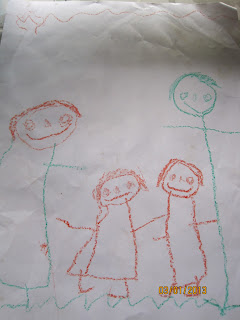"We'll have to tell Alex to come and get you here!" Laughed our captain. I wasn't sure whether he was joking or not, so I just said, "Dale, pues!"
Alex was already in the village of Platanares. The girls and I had stayed behind because of some scheduling overlaps. But the afternoon before I got a call from the man who was now tying the boat to a nearby tree (his name is Tovar). He told me he was heading up to the village and Alex had asked if I wanted to come along.
I had no way of getting ahold of Alex, so I just went for it. We packed up, caught a taxi early the next morning to the port, and here we were. Well, I wasn't really sure where we were. I knew the village was up river, but I didn't know how far.
Soon it became evident that we were getting out to walk the rest of the way. I tried to remember where the girl's clothes were packed, so that we would have a clean change of clothes when we arrived, but Tovar and his helper lifted our bags to their shoulders and started across the river. Managing the smaller bags as best as I could, we started hesitantly across the river as well. Carolyn was soon hoisted onto a pair of shoulders as well, and I told Abigail that we were going to have an adventure.
As we climbed up the opposite shore, I realized that I was going to have my first experience hiking through mangroves. I kept telling Abigail how brave she was being as we ducked and wove among the roots and overhanging branches, trying to avoid the deepes, stickiest spots of mud. At one point my flip-flop got stuck. I fished it out with my hand and went barefoot the rest of the way.
Finally we came out of the mangroves and crisscrossed back and forth through the river. I kept hoping that Abigail wouldn't ask to be carried because I was pretty sure I couldn't handle the backpacks, plus the slippery river rocks, plus her. She never did ask, but forged ahead through the river that was chest deep at times for her.
I am sure it took much longer than Tovar and his patient helper wanted, but we finally made it to the village. I will skip over the part about climbing up the muddy river bank. Let's just say that Carolyn and I took a good amount of mud with us.
The first thing I noticed upon arriving was that (hallelujah!) the biting flies, or chitras, weren't anywhere around. We were dutifully delivered to the pastor's house. I asked Tovar how much I owed him (I know it's usual for passengers to pay a few dollars to help with the gas costs) he wouldn't take anything.
Later I learned that Tovar had suggested picking me up himself, when we saw that Alex had brought the group and we had stayed home. Then he changed his schedule to make it more convienient for me. I was touched. How often does someone go out of their way, change their plan, carry your bag through the river and the mangroves, just so your family can be together.
It's experiences like this that have made the Wounan win my heart.






